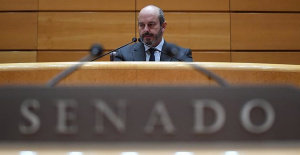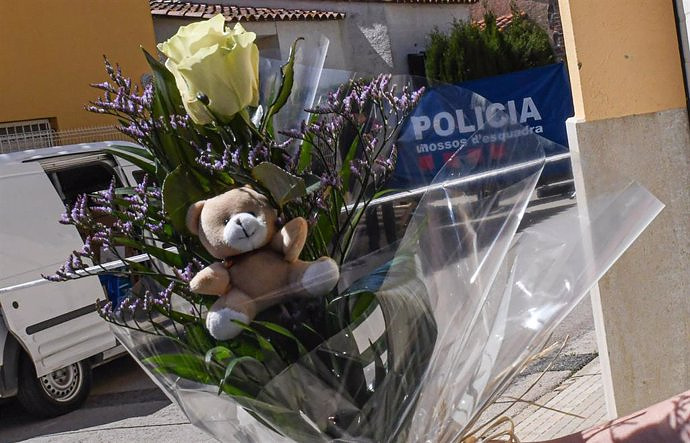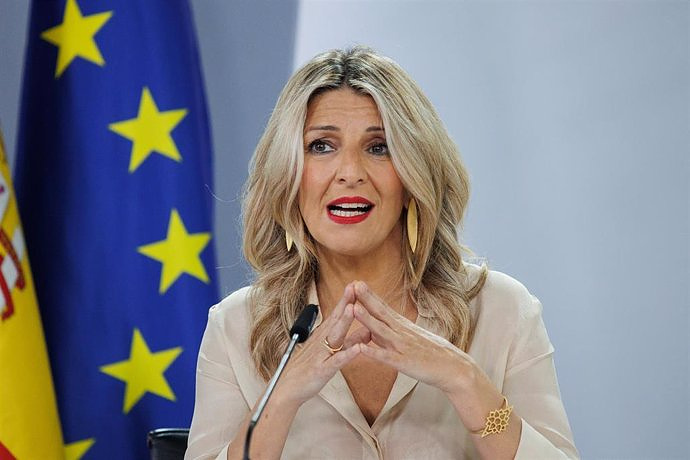MADRID, 10 Abr. (EUROPA PRESS) -
2024 may become the year with the most cases of vicarious violence in Spain in the entire historical series. Specifically, after the confirmation of sexist crime in the case of the woman and her two children from Barcelona, there are now seven children allegedly murdered by her father in 2024 and 57 since 2013, when data began to be collected. .
Thus, in the first four months of this year the same figure would have been reached as in all of 2015, 2018 and 2021, with seven cases. It was only surpassed in 2017, when eight cases of minors murdered due to gender violence were recorded.
According to the Ministry of Equality, 2024 is the year with the highest number of minors murdered by gender violence until April 10 since 2013. In fact, in no previous year have there been more than three cases to date.
Of the seven minors murdered this year, three of them had complaints or measures for gender violence, of which two had measures requested by their mother/legal guardian and in one there was no request for measures.
Likewise, five of the seven cases of minors murdered by vicarious violence this year were from Catalonia (71.4%), while the other two (28.6%) were from Andalusia.
By age, one of these minors (14.3%) was between one and two years old at the time of the alleged murder; one (14.3%) from three to four; one (14.3%) from five to six; three (42.9%) from seven to eight, the age range of the last two children who were victims of vicarious violence; and one (14.3) from nine to ten. All of them were Spanish.
Regarding the aggressors of minors, one of them (25%) was in the age group of 21 to 30 years, followed by one (25%) between 31 to 40, one (25%) between 41 to 50 and, the last (25%), between 51 to 60. Three of them were Spanish, while one was from another country.
On the other hand, the Ministry of the Interior has detected in the VioGén System more than 1,400 cases of gender violence with minors exposed to vicarious violence, of which 167 are at extreme or high risk, according to the latest report from March.
Specifically, this reflects that there are a total of 1,431 cases with minors at risk of being attacked by their mother's abuser, of which 1,264 are at medium risk, 159 at high risk, and 8 at extreme risk. It also states that as of March 31 of this year there are 111 cases with minors in situations of high and extreme vulnerability (109 and 2) and 1,438 on average.
The former Government delegate against gender violence, Miguel Lorente, has indicated in statements to Europa Press that, in his opinion, "a much more proactive attitude must be adopted" to be "effective" in detecting gender violence. . Furthermore, he considers that they are acting with a "very police" mentality, when it is not an exclusively police or judicial issue.
Furthermore, Lorente has indicated that he considers that the very concept of vicarious violence is generating "a certain distortion", because, in his opinion, it seems that we are talking about "different" violence. "Conceptualizing violence as vicarious when there is a murder, which seems like we are talking about something different, generates a lack of awareness and a lack of continuity in a violence that is, let's say, characterized by using it against someone who considers it to be their property, women, but also boys and girls," he stated.
Lorente has related four factors to gender violence and vicarious violence: seasonal, structural, denialism and imitation.
Regarding the imitation factor, he highlighted that, currently, there are elements to think that it may be having an impact in some way. "It's something human, it's not that of murderers, it's human. Humans function like this. And if we want to take away that characteristic from aggressors, we are making a mistake, because we are losing risk factors," she said.
Regarding denialist speeches, he has indicated that, in his opinion, they are feeding "the violent context and the violent people in that context." "The climate is a climate of violence. We are not talking about something that is happening with children, no, we are seeing how denialism, the criminalization of men, all that debate that is on the networks, that is present in At all times, it is feeding the violent and justifying the violent," he stated.

 Exploring Cardano: Inner Workings and Advantages of this Cryptocurrency
Exploring Cardano: Inner Workings and Advantages of this Cryptocurrency Seville.- Economy.- Innova.- STSA inaugurates its new painting and sealing hangar in San Pablo, for 18 million
Seville.- Economy.- Innova.- STSA inaugurates its new painting and sealing hangar in San Pablo, for 18 million Innova.- More than 300 volunteers join the Andalucía Compromiso Digital network in one month to facilitate access to ICT
Innova.- More than 300 volunteers join the Andalucía Compromiso Digital network in one month to facilitate access to ICT Innova.-AMP.- Ayesa acquires 51% of Sadiel, which will create new technological engineering products and expand markets
Innova.-AMP.- Ayesa acquires 51% of Sadiel, which will create new technological engineering products and expand markets The judge who admitted the complaint of Clean Hands against Begoña Gómez interrogates two media officials this Friday
The judge who admitted the complaint of Clean Hands against Begoña Gómez interrogates two media officials this Friday Thousands of people in Palma demand to defend Catalan against the "involutionary policies" of "a fanatical minority"
Thousands of people in Palma demand to defend Catalan against the "involutionary policies" of "a fanatical minority" Menotti, maestro of Argentine football since the 1978 World Cup, dies
Menotti, maestro of Argentine football since the 1978 World Cup, dies The amnesty faces its final stretch in the Senate with the question of whether it will be voted this week or after the Catalan elections.
The amnesty faces its final stretch in the Senate with the question of whether it will be voted this week or after the Catalan elections. How Blockchain in being used to shape the future
How Blockchain in being used to shape the future Not just BTC and ETH: Here Are Some More Interesting Coins Worth Focusing on
Not just BTC and ETH: Here Are Some More Interesting Coins Worth Focusing on A sensor system obtains the fingerprint of essential oils and detects if they have been adulterated
A sensor system obtains the fingerprint of essential oils and detects if they have been adulterated Faraday UPV presents the 'Origin' rocket to exceed 10 km of flight: "It is the beginning of the journey to space"
Faraday UPV presents the 'Origin' rocket to exceed 10 km of flight: "It is the beginning of the journey to space" The Generalitat calls for aid worth 4 million to promote innovation projects in municipalities
The Generalitat calls for aid worth 4 million to promote innovation projects in municipalities UPV students design an app that helps improve the ventilation of homes in the face of high temperatures
UPV students design an app that helps improve the ventilation of homes in the face of high temperatures A million people demonstrate in France against Macron's pension reform
A million people demonstrate in France against Macron's pension reform Russia launches several missiles against "critical infrastructure" in the city of Zaporizhia
Russia launches several missiles against "critical infrastructure" in the city of Zaporizhia A "procession" remembers the dead of the Calabria shipwreck as bodies continue to wash up on the shore
A "procession" remembers the dead of the Calabria shipwreck as bodies continue to wash up on the shore Prison sentences handed down for three prominent Hong Kong pro-democracy activists
Prison sentences handed down for three prominent Hong Kong pro-democracy activists ETH continues to leave trading platforms, Ethereum balance on exchanges lowest in 3 years
ETH continues to leave trading platforms, Ethereum balance on exchanges lowest in 3 years Investors invest $450 million in Consensys, Ethereum incubator now valued at $7 billion
Investors invest $450 million in Consensys, Ethereum incubator now valued at $7 billion Alchemy Integrates Ethereum L2 Product Starknet to Enhance Web3 Scalability at a Price 100x Lower Than L1 Fees
Alchemy Integrates Ethereum L2 Product Starknet to Enhance Web3 Scalability at a Price 100x Lower Than L1 Fees Mining Report: Bitcoin's Electricity Consumption Declines by 25% in Q1 2022
Mining Report: Bitcoin's Electricity Consumption Declines by 25% in Q1 2022 Oil-to-Bitcoin Mining Firm Crusoe Energy Systems Raised $505 Million
Oil-to-Bitcoin Mining Firm Crusoe Energy Systems Raised $505 Million Microbt reveals the latest Bitcoin mining rigs -- Machines produce up to 126 TH/s with custom 5nm chip design
Microbt reveals the latest Bitcoin mining rigs -- Machines produce up to 126 TH/s with custom 5nm chip design Bitcoin's Mining Difficulty Hits a Lifetime High, With More Than 90% of BTC Supply Issued
Bitcoin's Mining Difficulty Hits a Lifetime High, With More Than 90% of BTC Supply Issued The Biggest Movers are Near, EOS, and RUNE during Friday's Selloff
The Biggest Movers are Near, EOS, and RUNE during Friday's Selloff Global Markets Spooked by a Hawkish Fed and Covid, Stocks and Crypto Gain After Musk Buys Twitter
Global Markets Spooked by a Hawkish Fed and Covid, Stocks and Crypto Gain After Musk Buys Twitter Bitso to offset carbon emissions from the Trading Platform's ERC20, ETH, and BTC Transactions
Bitso to offset carbon emissions from the Trading Platform's ERC20, ETH, and BTC Transactions Draftkings Announces 2022 College Hoops NFT Selection for March Madness
Draftkings Announces 2022 College Hoops NFT Selection for March Madness
























